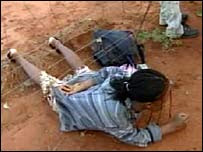
MURDER!
So we have another horrific murder, pieces of woman’s body turning up in the dustbins of picnic stops along the main B1 road traversing the country, with supplementary disgusting detail, like the body parts seeming to have been stored in a fridge or freezer before being dumped.
But even more depressing, if possible, is the nebula of knee-jerk reaction, verbal detritus and media sensationalism surrounding it.
This is wearily familiar and predictable : very soon there will be a fourth rate politician calling for the reintroduction of the death penalty, which in turn “sparks a debate” in the media. A hell-fire preacher will “reveal” that the murders are God’s punishment for the debauchery of society (and for failing to pay church dues on time). Someone, as in the cretinous ramblings of “Concerned Namibian” in last week’s letters to the Editor, will alight on the true cause – criminal illegal foreigners. Hence, clamp down on immigration. The “I’m not xenophobic, but…” school of thought.
The police’s lack of resources will be blamed. Even if the police had hundreds of helicopters, there would still be murders.
Violence on TV will be blamed, Long before there even was TV, thee were murders.
Worst of all are the screeching spreads and sloppy logic of press coverage. A front page spread from Google Earth (!) showing the road from Rehoboth to Okahandja, which of course takes in the entire area of Windhoek, indicating the discovery of four bodies for the last three years, conveys the breathless announcement that the possibility of links between the murders “cannot be ruled out”. Well, the possibility that my great-grandmother was a Martian cannot be ruled out either (I never knew her). Whether the unsolved ‘B1’ killings of the past couple of years are connected is a matter for sober investigation, not for “Jack the Ripper” type hysteria.
The bit about bodies in the freezer also seems highly speculative. It's the middle of winter, with temperatures dropping near zero in the Windhoek area, so that body parts found outdoors early in the morning will be 'chilled'.
“B1 Butcher” scream the headlines, from a subber who has discovered the power of alliteration. A leading article declared “we are at war”, an absurd non-sequitur, reminiscent of course of the fake “war on terror”.
Likewise the lurid press cartoons of ghouls, demons and bizarre biblical devils, with the greatest respect to the cartoonist, are not helpful. I say this because, as likely as not, the murderer(s), when caught, will look not like a demon but more like the shy quiet little shopkeeper from across the road. I am of course casting no aspersions on shopkeepers. The biggest mass killer in history in the UK was a family doctor. “The banality of evil” as somebody expressed it.
Then there is the effort by that journalistic abortion which amazingly is still Namibia’s only weekend publication. It splashes in disgusting detail every photograph from every angle of every body part, under no other pretext but sheer blood lust. Where does it get this material? Is there a corrupt relationship between this paper and police forensic or pathology units?
The media vultures swarm round this event, but what about the “normal” murders? What about the women killed in the “comfort” of their own homes, and other Saturday night victims? They may not be dismembered in rubbish bins, but they are still just as dead. Their passing hardly rates an inside two-liner in the weekly crime round up.
We need to put a couple of sometimes-subconscious assumptions straight. First, that such barbaric incidents occur only in ‘backward’ countries or regions, and among the lower, illiterate, lawless ‘classes’. A recollection of the cases of Lord Lucan, O.J. Simpson, Charles Manson and currently Phil Spector make this fallacy very clear. Secondly that they are caused by rampant ‘evil’ in society. This is meaningless, anyway. No, such things can occur anywhere, in any social environment.
I am no psychologist, and the analysis of the reasons for these attacks on womena and children is hugely complex. It seems that they must have to do with the erosion of traditional male prestige and authority, frustration, sexual and otherwise. There is innate violence in human character. Give anyone untrammelled power over his community or neighbours, and he will start to behave like a Nazi.
There is the perverse urge to draw attention to oneself. He who disposes of body parts in picnic dustbins is not so much trying to dispose of them but to draw attention to them and himself. There is a grim distinction between random, alcohol-fuelled murders and those planned to the extent of reserving freezer space for the victims (if this is what happened).
Not that any of these are an excuse or justification for violence, and killers need to be found, prosecuted and removed from society by the full force of the law. But these horrors need to be confronted with more rationality, and fewer clichés.






























